
Service Science
Scope & Guideline
Exploring Interdisciplinary Insights for Service Excellence
Introduction
Aims and Scopes
- Conservation and Biodiversity:
The journal emphasizes research aimed at understanding and conserving biodiversity, highlighting the importance of ecological and genetic studies in various species and ecosystems. - Human-Wildlife Interactions:
A core focus is on the dynamics between humans and wildlife, addressing conflicts, coexistence strategies, and community engagement in conservation efforts. - Sustainable Management Practices:
The journal promotes innovative and sustainable management practices in conservation, including the use of technology, community-based approaches, and policy recommendations. - Interdisciplinary Approaches:
Research often integrates multiple disciplines, including ecology, sociology, anthropology, and technology, to provide comprehensive solutions to complex conservation challenges. - Restoration Ecology:
The journal explores strategies for ecological restoration, focusing on both natural and anthropogenic influences on ecosystems and the role of local communities in restoration efforts.
Trending and Emerging
- Community-Based Conservation:
There is a growing emphasis on community-based approaches that involve local stakeholders in conservation efforts, recognizing the importance of local knowledge and engagement. - Technology in Conservation:
The use of advanced technologies, such as remote sensing, AI, and genomic tools, is increasingly prominent, showcasing innovative methods for monitoring and managing wildlife populations. - Climate Change Adaptation:
Research addressing the impacts of climate change on biodiversity and ecosystems is on the rise, focusing on adaptive strategies and the resilience of species and habitats. - Transboundary Conservation Initiatives:
Emerging interest in transboundary conservation efforts reflects the need for collaborative approaches to biodiversity management across national borders. - Socio-Ecological Systems:
There is a trend towards examining conservation within the framework of socio-ecological systems, integrating social, economic, and environmental factors to address complex conservation challenges.
Declining or Waning
- Traditional Conservation Methods:
There is a noticeable decrease in papers focusing on traditional conservation methods, as the journal increasingly prioritizes innovative and participatory approaches that engage local communities. - Species-Specific Studies:
Research that centers solely on individual species without considering broader ecosystem dynamics is becoming less frequent, reflecting a trend towards holistic and integrated conservation strategies. - Invasive Species Management:
Studies focused exclusively on invasive species management are declining, as the journal shifts towards broader ecological interactions and the impacts of climate change on ecosystems. - Policy Analysis:
Analyses of conservation policies in isolation are waning, with a shift towards examining the effectiveness of policies in real-world applications and their social-ecological implications. - Historical Data Analysis:
Research relying heavily on historical data without contemporary context is becoming less common, as the journal favors studies that address current challenges and future conservation strategies.
Similar Journals
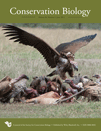
CONSERVATION BIOLOGY
Advancing ecological insights for a sustainable future.CONSERVATION BIOLOGY, published by Wiley, is a leading journal in the field of ecology and conservation, with a focus on disseminating high-quality research that addresses pressing environmental challenges. With a strong impact factor and categorized in the top quartile (Q1) across various relevant fields including Ecology, Evolution, Behavior and Systematics, and Nature and Landscape Conservation, the journal plays a pivotal role in advancing the scientific understanding of biodiversity and conservation practices. Since its establishment in 1987, CONSERVATION BIOLOGY has provided a vital platform for researchers, professionals, and students to share innovative findings and facilitate discussions surrounding ecological sustainability and conservation strategies. Although it is not an open-access publication, it ensures that a wide range of significant research is accessible to the global scientific community. The journal’s rigorous peer-review process and reputation for excellence make it an essential resource for anyone involved in the study of ecology and conservation.
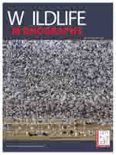
WILDLIFE MONOGRAPHS
Advancing wildlife conservation through rigorous research.WILDLIFE MONOGRAPHS, published by WILEY, is a prestigious journal dedicated to advancing the understanding of ecological and biological sciences with a keen focus on wildlife conservation and management. With an ISSN of 0084-0173 and an E-ISSN of 1938-5455, this journal has established itself as a leader in its field, ranking in the Q1 quartile for both Ecology, Evolution, Behavior and Systematics and Nature and Landscape Conservation in 2023. The journal's remarkable impact is underscored by its Scopus rankings—46th out of 721 in Agricultural and Biological Sciences and 17th out of 211 in Environmental Science, highlighting the journal's influential role in shaping research discussions and policy in wildlife management. Available in print and online, WILDLIFE MONOGRAPHS publishes comprehensive studies that inform practitioners, researchers, and students alike, fostering a deeper insight into biodiversity and ecosystem dynamics. Founded in 1981, the journal continues to evolve, contributing significantly to the scientific community through rigorous peer-reviewed articles that bridge the gap between theory and practical application in wildlife management.

Global Ecology and Conservation
Championing innovative solutions for environmental challenges.Global Ecology and Conservation, published by Elsevier, stands as a premier open-access journal dedicated to advancing the field of ecology and conservation science. Since its inception in 2014, the journal has facilitated the dissemination of high-quality research, fostering critical dialogue on ecosystem management, biodiversity preservation, and sustainability practices across the globe. With a remarkable ranking within the top quartiles (Q1) in various categories including Ecology, Evolution, Behavior and Systematics, and Nature and Landscape Conservation, it is positioned among the leading resources for researchers and professionals alike. The journal has garnered a notable impact, ranking #65 out of 721 in Ecology, and houses articles that are vital to understanding and addressing the pressing environmental challenges of our time. Available in an open-access format, researchers can freely access and share vital findings, promoting a collaborative approach to ecological research. Global Ecology and Conservation is not just a publication; it is a critical tool for innovation and advocacy in conservation, poised to inspire the next generation of environmental stewards.
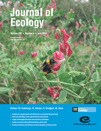
JOURNAL OF ECOLOGY
Advancing ecological knowledge for a sustainable future.JOURNAL OF ECOLOGY, published by Wiley, stands as a leading publication in the field of ecology, evolution, behavior, and plant science, currently positioned in the prestigious Q1 quartile across these categories. Established in 1976, the journal has consistently provided a platform for innovative research and critical discourse related to ecological patterns, processes, and interactions. With its robust Scopus ranking—31st out of 721 in Ecology, Evolution, Behavior and Systematics, and 26th out of 516 in Plant Science—this journal notably reflects the high impact and influence of its articles in the scientific community. Although it does not offer open access options, the journal ensures comprehensive dissemination of pivotal findings to researchers, professionals, and students alike. Located in the United Kingdom at 111 River St, Hoboken, NJ, the JOURNAL OF ECOLOGY remains an essential resource for those dedicated to advancing our understanding of ecological systems and their complexities.
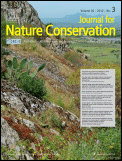
JOURNAL FOR NATURE CONSERVATION
Advancing the Science of ConservationJOURNAL FOR NATURE CONSERVATION, published by Elsevier GmbH, serves as a pivotal platform for the dissemination of applied and theoretical research in the fields of ecology, nature, and landscape conservation. With an ISSN of 1617-1381 and an E-ISSN of 1618-1093, this esteemed journal has earned a notable reputation, ranking in the Q2 category for both Ecology and Nature and Landscape Conservation in 2023. It is indexed in Scopus with commendable rankings, including #67/211 in Environmental Science - Nature and Landscape Conservation, highlighting its significance within the academic community. The journal’s diverse scope captures the complexities of environmental challenges and offers insights beneficial to researchers, conservationists, and policymakers dedicated to preserving biodiversity and facilitating sustainable practices. Situated in Munich, Germany, the journal has continuously contributed valuable knowledge since its inception in 1991, making it an essential resource for those committed to advancing conservation efforts on a global scale.
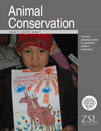
ANIMAL CONSERVATION
Transforming Insights into Action for Animal Conservation.Animal Conservation is a prestigious journal that serves as a vital platform for the dissemination of research dedicated to the preservation of wildlife and habitats. Published by Wiley, this journal has established a significant presence in the fields of Ecology and Nature and Landscape Conservation, holding a distinguished Q1 category ranking for both in 2023. With an impressive Scopus rank of #25 in the realm of environmental science, it caters to a global audience keen on understanding and addressing pressing conservation issues. The journal provides researchers, professionals, and students with high-quality, peer-reviewed articles that explore innovative methods and strategies in animal conservation. With its continuous publication since 1998, encompassing a comprehensive range of topics, Animal Conservation is indispensable for anyone aiming to make impactful contributions to the field of ecology and conservation biology.

BIODIVERSITY AND CONSERVATION
Illuminating the path to effective ecosystem management.Biodiversity and Conservation is a leading peer-reviewed journal published by Springer, dedicated to advancing the understanding of biodiversity and the critical aspects of conservation biology. With an impact factor that consistently places it in the Q1 category across multiple fields including Ecology, Evolution, and Nature and Landscape Conservation, this journal serves as a vital resource for researchers, professionals, and students who aim to address the pressing challenges of biodiversity loss and ecosystem management. Established in 1992, the journal has successfully created a platform for high-quality research and innovative approaches, facilitating the dissemination of knowledge that informs conservation practices globally. With a strong ranking in Scopus, it highlights the importance of rigorous scientific inquiry in the preservation of our natural world. Subscribers can access a wealth of articles that encompass a broad range of topics pertinent to both theoretical and practical aspects of biodiversity, encouraging an interdisciplinary dialogue among the diverse fields of environmental science and conservation.

Ecological Solutions and Evidence
Transforming evidence into actionable ecological strategies.Ecological Solutions and Evidence, published by WILEY, stands as a leading platform in the field of ecology, environmental science, and sustainability, with a commendable reputation starting from its inception in 2020. Operating under rigorous academic standards, this journal has achieved notable distinctions by securing a Q1 category ranking in Ecology, Management, Monitoring, Policy and Law, and Nature and Landscape Conservation, making it an invaluable resource for researchers seeking to address pressing environmental challenges. With a current impact factor reflective of its influential articles, the journal features an international scope, focusing on innovative solutions derived from empirical evidence. Accessible to a global audience, the journal encourages open discourse in the field, further supporting researchers, professionals, and students striving to foster ecological sustainability and informed policy-making. Published in the United Kingdom, it aims to bridge the gap between science and application in real-world contexts, promoting actionable insights and interdisciplinary collaboration.
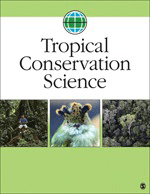
Tropical Conservation Science
Fostering collaboration for a thriving planet.Tropical Conservation Science, an esteemed journal published by SAGE Publications Inc, plays a pivotal role in the field of environmental science, particularly within the realms of ecology and nature conservation. Established as an Open Access platform since 2008, it facilitates global dissemination of critical research findings dedicated to the preservation of tropical ecosystems. With an impressive impact factor reflected in its Q2 rankings within both ecology and nature landscape conservation categories for 2023, the journal is ranked in the 66th percentile for Environmental Science and maintains a strong position in the academic community. The journal’s scope encompasses a wide array of tropical conservation issues and aims to foster interdisciplinary collaboration among researchers, professionals, and students committed to advancing conservation strategies. Tropical Conservation Science is not merely a publication; it's a vital resource contributing to the safeguarding of our planet's biodiversity.

LIMNETICA
Elevating the discourse in water science and technology.LIMNETICA is a prestigious academic journal dedicated to advancing the field of Aquatic Science, Ecology, and Water Science and Technology. Published by the Asociación Española de Limnología in Spain, this journal serves as a vital platform for researchers and professionals seeking to share their findings and insights from 1996 to 2024. With a commendable Q2 ranking in Ecology and notable Q3 rankings in Aquatic Science and Water Science and Technology, LIMNETICA emphasizes high-quality, peer-reviewed research that contributes to our understanding of freshwater ecosystems. Although currently not classified under Open Access, its rigorous indexing and Scopus rankings—positioning it in the top 64th percentile for Environmental Science—illustrate its impact in the scientific community. Researchers, students, and professionals are encouraged to engage with LIMNETICA to stay abreast of key developments and foster collaborative efforts in aquatic research.